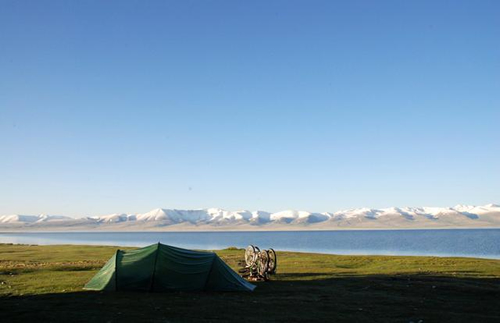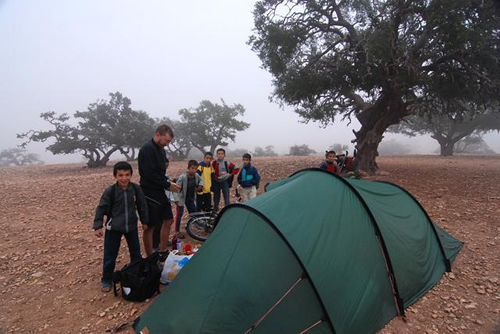Wild Camping Abroad
Sleeping Responsibly and for Free in Nature's Most Beautiful Spots
Story and photos by Friedel Rother

|
|
Wild camping in Kyrgyzstan, on the shores of Lake Song Kol.
|
“Away, away, from men and towns,
To the wild wood and the downs —
To the silent wilderness
Where the soul need not repress
Its music lest it should not find
An echo in another's mind,
While the touch of Nature's art
Harmonizes heart to heart.”
— Percy Bysshe Shelley, The Invitation
The best things in life are free, as the saying goes, and doubly so if you are traveling on a budget.
Now just imagine sleeping for free in some of the world's most beautiful places, from the alpine lakes in Kyrgyzstan to flower-filled meadows in Italy, and surfing beaches in Australia. Sounds impossible? Not if you are willing to try wild camping, the art of pitching your tent on unclaimed land instead of using campsites or staying in hotels.
For people outside the world of serious nature lovers and those who live for adventure, wild camping (also known as free camping or stealth camping) may be something of a mystery. Guidebooks do not normally mention it as an option, and you certainly will not see it outlined in glossy tourism brochures either. Yet a sizable minority of travelers, particularly motor bikers, cyclists, and hikers, participate in wild camping regularly to stretch their travel funds, and as a way of experiencing remote places that may not have formal accommodations.
Even if a bus or train tends to be your main mode of transport, wild camping can still come in handy. Imagine that you wish to explore a national park or walk a long trail like Spain's Camino de Santiago. Knowing how to wild camp, you can go at your own pace and enjoy places off the beaten track, without the pressure to get to the next official sleeping location.
While the added freedom and flexibility are appealing, the idea of wild camping can be intimidating if you have never tried it before. The top two concerns most people have are: is it legal and is it safe?
The legality of wild camping varies from country to country and sometimes between regions. In Britain it is tolerated, as long as you do not use marked private land and keep a reasonable distance from people. In Australia, bush camping, as its often called, is usually allowed, particularly in state forests and outside town limits. Less developed countries do not tend to have any laws on wild camping and in places where nomadic life is part of the culture, wild camping is seen as quite normal. Research the policies and practices of the area you want to visit before you go.
Low-Impact Camping
As a general guideline, be discreet, practice low-impact camping techniques and avoid putting your tent anywhere you see the land is fenced off, marked with “no trespassing” signs or being used for farming. As long as you choose a hidden spot, with no obvious signs of ownership, and respect the land you are on by not starting fires and carrying out all your litter, it is very unlikely you will be bothered.
We have never had a problem yet and we were only regularly discovered in Morocco and the Middle East. Shepherd crossing the remote landscapes with their flocks always seemed to cross our tent. “Do you need anything?” they would ask as they approached. Bread, sugar and extra blankets were all frequently offered. We hardly would have had better service at the Hilton.

|
|
Wild camping in Morocco, meeting the local kids, who arrived to "help" us pack in the morning, on their way to school
|
Safety while Camping
As for safety, looking back on 200 nights of wild camping, we do not feel our security was ever threatened. Sometimes the first place we tried wasn't suitable but we always found a better alternative before long. There were, however, a few nervous evenings as we adapted to the sounds around us.
Having never camped outside an official site, we had no idea how many things go “bump” in the night in a perfectly normal forest. “What's that?” we would whisper to each other, hoping an axe murderer was not about to descend on the tent. Later we realized that it was just a branch falling or a mouse scurrying by. It took a few months to become more at ease with the rustling of the forests we usually called home.
The dangers we did face were easily circumvented. In tick areas, we did regular checks to ensure we were not carrying any new friends. In Australia, we learned to never camp under a gum tree, which tends to drop branches frequently and without warning. The Rocky Mountains of North America are known for bears, which you can avoid attracting by cooking and eating away from your sleeping place and not keeping food in the tent.
Safety is never guaranteed of course. If you are in the woods when the local serial killer decides to go for a midnight stroll and just happens to pick the path past your tent (an extremely unlikely scenario), then luck is not on your side. But by remembering the basic rules of staying hidden and sticking to remote or rural places, our sleeping spots have always been far more tranquil than terrifying.
With a little time, you will soon become at ease with the sounds of the night world and you might just start to enjoy it. There is nothing quite like slipping out of your tent in the middle of the night just to gaze at a sparkling sky or a landscape lit up by a full moon and having it all to yourself to admire.
And you can enjoy it all for responsibly and for free.
Wild Camping Tips
-
Get a good map. Look at the area where you would like to camp and read the map for clues to the landscape. Forests and logging tracks are good hunting grounds but mountainous areas can be devoid of flat spots for your tent. Vineyards or farming fields indicate plenty of private land.
-
The more isolated, the better. Safety is the first worry most people have when they start wild camping but the fewer people that know you are there, the less likely you are to have any trouble. Place yourself outside towns and villages and find a spot that is hidden from the main road. This could be behind a few trees or along a hiking path.
-
Buy a green tent. A bright orange tent might look pretty but you will regret the choice when you are trying to hide the forest. In warm, dry weather you might well get away without a tent. Just a bivvy sack and a sleeping mat will do. Hammocks that can be slung between any two trees are another option blends well into the landscape.
-
Avoid potential party spots. Sometimes you will find a place that looks great by day but might be the local drinking hole at night. Usually there are signs of this on the ground. If you see litter, discarded beer bottles and cigarette packets, just move on.
-
Bring extra water. Because you are not at a campsite, you will need to supply your own water for drinking and washing, unless there's a nearby lake or river to filter water from.
-
Wait until dusk to set up. As long as the weather and the mosquitoes cooperate, it's best to delay pitching your tent as long as possible. This further reduces the chances that anyone passing by will know you are sleeping in the area. Sit down, read a book, make supper and relax until you're ready to go to bed. Sometimes you may find a good spot but then return to a nearby town, have a meal and only come back to put up your tent just as the sun is setting.
-
Do not be afraid to ask for help. If the terrain is not amenable to wild camping, get suggestions from the locals. This goes against the general rule of staying hidden but sometimes people will suggest surprising alternatives that you'd never find on your own. Farmers may be happy to offer a spot beside their barn. We have spent many a happy night with our tent propped up next to or even inside mosques, churches, temples, and police stations.
-
Carry a small trowel for toilet business. Human feces can easily contaminate local water systems, as well as being unsightly for other people. Dig a small hole a few centimeters deep and bury any waste you create.
-
Bring baby wipes. They are compact, light and perfect for wiping off the day's grime when you cannot have a shower. Soap and water will do as well, as long as you've got the water with you to spare. If there is a local river or brook, dump your soapy water as far away as possible from the water source.
-
Never camp in a dry riverbed. They look appealing, being frequently flat and hidden from roads, but a rainstorm even a few hundred kilometers away can make the river spring into life with no warning.
|
Friedel Rother gave up her job as a journalist for Reuters to ride a bicycle around the world with her husband. After pedalling 48,000km (30,000 miles) through 30 countries around the globe, she can now be found riding her bike around The Netherlands and working on a book about her 2-wheeled adventure.
|
